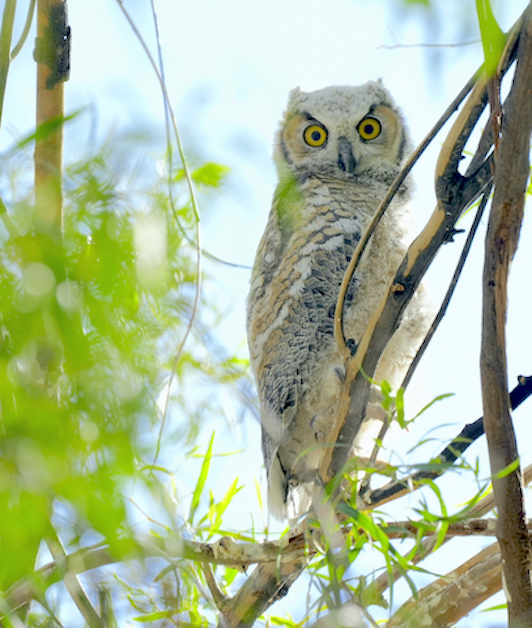I first read James Wright’s poem, To the Saguaro Cactus in the Desert Rain, when I was much younger and still trying to see my way through the thickets of poetry. But I felt a kinship to the images of James Wright from the start. He, too, was from Ohio and I knew the horses in the farm fields he drove past, beautiful in their loneliness, and I knew, too, the feel of my own horse’s ear, “delicate as the skin over a girl’s wrist.”
I thought about James Wright and his poem a few weeks ago in Arizona. I was lured there with my camera by the online promise to birders of “500 species of birds” passing the arid desert border between Arizona and Mexico in spring migration. The morning I walked through Sabino Canyon up the Phoneline trail to Blackett’s Ridge, I expected, I suppose, a whole murmuration of exotic birds to sweep over the cacti and the yellow haze of the blue palo verde tree. Or, surely, at least the elf owl snuggled in an old woodpecker’s hole high above me in the arms of James Wright’s saguaro.
But what I saw instead before the late morning’s tongue of heat pushed me back-canyon to the parking lot was more than just the common band-tailed pigeons pecking at the saguaro’s white blossoms, their plaintive cry taking me back to the doves that haunt our Colorado backyard. Or even further back to the pond mists of my father’s Ohio farm and the mourning doves that woke me so gently each morning when I was a girl at home.
You see, when I was young, dreaming of being a poet, I always thought of James Wright as a “nature” poet. And I wanted so much to write like him. Yet his poetry is much more complex than what I knew then. It weaves together, of course, the beautiful things of nature, like elf owls and desert rain and weeping tarantulas. But also the forces of the the human world—its factories and the bitter politic places that Wright once “tore” himself out of. Forty years past the first time I read James Wright’s love poem to the elf owl and the saguaro, I can’t still be a poet and forget the thirst and the brutal sun that always exist, no matter how much I wanted as a girl to only dream of the beautiful and the pensive.
Walking through that spring Arizona desert, I suddenly realized, unmentioned by the online tourist engines that had brought me here, that just an hour drive south were the loops of razor wire and the “vertical barriers” we had constructed so cruelly and haphazardly at the border to deter the migrants who trek here, foot-weary and heavy, thousands of miles with their tiny children through places more barren than that late-morning desert, the homes that their children, too, loved, abandoned. This is what I really saw.
Ironically, later, in a tiny wild place between the rough of a neighboring golf course and the hotel parking lot, I found the birds I couldn’t in the desert: gilded flickers guarding the nest holes they excavate into the saguaros. And then a desert cardinal and a painted redstart stuttering through the trees. On the golfing green, so close I stopped breathing to see it, the greater roadrunner, masked in the blue, white, and orange of the orbital skin behind its eyes, stared transfixed at me, until it flashed past.
It wasn’t in the desert where I found this owl either, but on the grounds of the same hotel where an attendant at the “guard” hut waved us toward the trees behind her to show us the baby great horned owls. Not the elf owl. They had spent the first months of their lives nested in the rafters of the hotel’s entrance until finally, their wings fledged and they hopped and flapped their way to these trees, planted so close to an unspoken border by a golf course community, a place that my son-in-law reminded me should never in a desert have existed.
To the Saguaro Cactus in the Desert Rain
by James Wright
I had no idea the elf owl
Crept into you in the secret
Of night.
I have torn myself out of many bitter places
In America, that seemed
Tall and green-rooted in mid-noon.
I wish I were the spare shadow
Of the roadrunner, I wish I were
The honest lover of the diamondback
And the tear the tarantula weeps.
I had no idea you were so tall
And blond in moonlight.
I got thirsty in the factories,
And I hated the brutal dry suns there,
So I quit.
You were the shadow
Of a hallway
In me.
I have never gone through that door,
But the elf owl's face
Is inside me.
You are not one of the gods.
Your green arms lower and gather me.
I am an elf owl's shadow, a secret
Member of your family.
from poets.org









